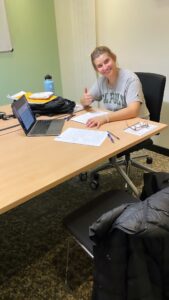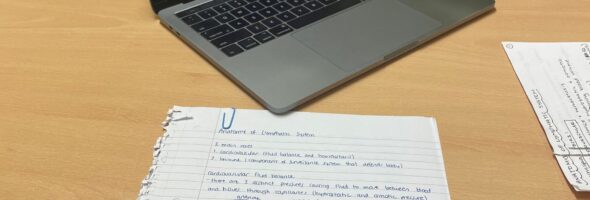Hey everyone! I hope everything is well😊
My name is Nina and I am just finishing up my first semester of the first year GEP programme here at R(D)SVS. Right now, we are in the middle of exam season and we are a few days away Christmas break! I wanted to make a quick blog post about how I have been studying for exams and some tips/tricks that helped me successfully get through the semester.
- Notes during lecture – this really depends on the course. In some lectures I like to actively write down notes while the professors are speaking (typing is easier for me as I can type much faster than I can write), and some lectures I choose to just sit and listen. This depends on your study habits, and you should choose what helps you learn best. Try not to focus too much on what your other classmates are doing as everyone learns differently.
- Rewatch lectures that you feel you need to – I find that rewatching certain lectures that are filled with a lot of detail and information helps my understanding. This way I can pause or rewind the recorded session and write down important information that I missed during the live lecture. I don’t do this for all of the lectures as it can be time consuming.
- Quizlet – this is a great tool for making online cue cards. They are easy to make and you can have them on your phone for when you don’t have your study material out. I like to look at these on my way to and back from school during the 45 minute commute.
- Answer learning objectives – With every lecture we are given 4-5 learning objectives. These objectives highlight the main concepts of the given lecture and it’s a great tool for reviewing. I encourage you to try to answer these objectives on your own after each class is over. They are also great to use when studying for exams. We are told that if we can answer these learning objectives on our own, we will do well on our exams.
- Using a blue pen and yellow highlighter – I’m not sure how accurate this is, but I have heard that writing your notes in a blue pen and using a yellow highlighter influences memory.
- Purchased hard copy notes –We are given booklets with printed-out lecture notes at the beginning of each semester. After I am finished reviewing each lecture, I quickly read through and highlight these notes as a way of reminding myself what we just covered in class. They’re around 2-3 pages long per lectures so its a quick read if you keep up! Students have the option to purchase hard copies, but free online copies are available as well.
- Active learning – when you are studying, try your best to ACTIVELY learn. Don’t sit and read notes over and over because this will make it difficult to retain any knowledge. Quizzing yourself and trying to recall information without looking at your notes is 10x better than just passively reading slides. I try to draw out diagrams on paper or on a white board and try to explain broad concepts on my own after studying.
- Get a study buddy – It is really helpful to find a friend who has the same study habits as you. When we are preparing for exams, we go over every lecture out loud together and repeat concepts back and forth until they stick. You are more likely to remember something if you say it out loud to yourself or a friend. Studying with a peer is also great motivation! There have been days where I didn’t feel like studying, but making plans to go to the library with a friend helps me stick to them. It also makes you feel like your in it together which can significantly reduce stress. I highly recommend trying this study trick! This is one of my most helpful studying habits.
- Study breaks – Please don’t forget to do the things you love to do! Taking regular breaks will help refresh your mind and it’ll prevent you from getting tired. Whether its going to the gym or grabbing coffee with a friend, its important for your mental health to not over work yourself when studying.
Thank you !
Nina
Exam Tips! / Stories from Vet School by blogadmin is licensed under a Creative Commons Attribution CC BY 3.0



